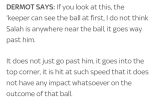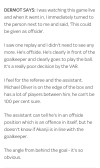And this is how it all started. Remember the whinging by sky tv about decisions. Half and full time chats about, ''was it a pen/foul/throw-in'' etc. They introduced refereeing by media and bt quickly followed.
This gave the var advocates ammunition, saying mistakes can cost games, which in turn can lose a team a final or promotion/relegation. And with the big money attached then the game needed a foolproof system to cut out these 'costly mistakes'.
Well it hasn't fucking worked has it. I've seen plenty of var 'mistakes' since its introduction that have cost teams big time.
Football is not a science and cannot be foolproofed.



